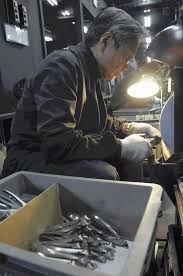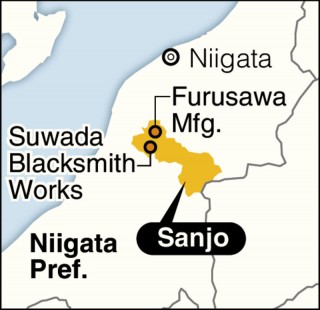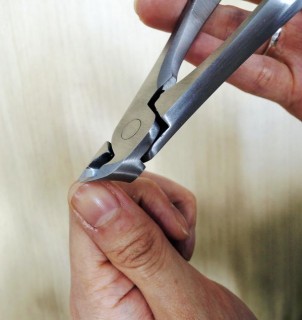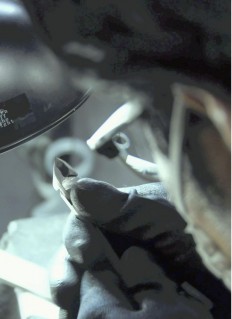Loading
Search
▼ Daily Craftsmanship / Nail Nippers Highly Valued at Home, Abroad
- Category:Souvenir
By Miwa Uehara / Yomiuri Shimbun Staff Writer This is the fourth installment of a six-part series.
SANJO, Niigata — People who are accustomed to ordinary flat nail clippers might be confused for a moment by nail nippers, which look like a carpenter’s tool.
Compared to flat clippers, which bring the upper and lower blades together to cut off sections of a nail at once, nail nippers are used like scissors to cut nails little by little, requiring less strength. This makes it easier to cut nails along the original shapes.
All users need to do is place on their nail the edge of the slightly curved blades of nipper-type nail clippers. A snapping sound is heard when you squeeze the handle, and the cut nail drops down without flying off like it would with standard nail clippers. Users will find the cut side of the nail to be surprisingly smooth, so there is no need to file the nail afterward.
The quality of nail clippers produced in the city of Sanjo, Niigata Prefecture, which is famous for its ironware industry, are highly appreciated both in Japan and abroad. They can neatly clip hard and deformed nails, and cut nails are less brittle, so they are used by medical institutions and professional manicurists.
Only a few factories mainly produce nail nippers in Sanjo. One of them is Suwada Blacksmith Works Inc.
Precision
An experienced craftsman shaves the tip of a small blade edge with a diamond file and holds it against the light. He repeats the move again and again, sometimes up to 10 times to produce a single nail nipper.
“When no light can be seen between the two blades, they are perfectly put together. This process is important, because the sharpness depends on it,” said Hideo Kobayashi, 84, who has made nail nippers for about 70 years.
But the blades should not be filed too much. Fine adjustments are made using only the fingertips so that the delicate ends of the blades precisely fit. Those watching the delicate process will catch their breath.
Precision
An experienced craftsman shaves the tip of a small blade edge with a diamond file and holds it against the light. He repeats the move again and again, sometimes up to 10 times to produce a single nail nipper.
“When no light can be seen between the two blades, they are perfectly put together. This process is important, because the sharpness depends on it,” said Hideo Kobayashi, 84, who has made nail nippers for about 70 years.
But the blades should not be filed too much. Fine adjustments are made using only the fingertips so that the delicate ends of the blades precisely fit. Those watching the delicate process will catch their breath.
The company’s staff, from young employees to experts, work silently, continually looking down at their hands. Overall, there are 50 to 100 processes involved in making one nipper, including forging steel and stainless steel, shaping handles, shaving the blades, adjusting the two blades so they match, and polishing. Each stage requires precision.
“A tiny gap in difference leads to blunt blades,” Kobayashi said.
Artisan pride
The ironware industry in Sanjo dates back to the Edo period (1603-1867), when farmers began manufacturing iron nails as a side job. Production later expanded into kitchen knives and sickles, and professional blacksmiths and hardware dealers also appeared.
Furusawa Mfg. Co. in the city is another factory known for manufacturing high-quality nail nippers. According to President Yukiro Furusawa, 54, Suwada Blacksmith Works was the first company in the region to produce an original type of present nail nippers, but Furusawa Mfg. invented nipper-shaped nail clippers with diagonal blades about 40 years ago.
“A tiny gap in difference leads to blunt blades,” Kobayashi said.
Artisan pride
The ironware industry in Sanjo dates back to the Edo period (1603-1867), when farmers began manufacturing iron nails as a side job. Production later expanded into kitchen knives and sickles, and professional blacksmiths and hardware dealers also appeared.
Furusawa Mfg. Co. in the city is another factory known for manufacturing high-quality nail nippers. According to President Yukiro Furusawa, 54, Suwada Blacksmith Works was the first company in the region to produce an original type of present nail nippers, but Furusawa Mfg. invented nipper-shaped nail clippers with diagonal blades about 40 years ago.
“When we made [products] back then, we influenced one another through imitation and emulation,” he said.
Both companies were initially blacksmiths that produced a tool for carpenters to cut wires. After the end of World War II, they began manufacturing nail clippers, as though they were competing with their techniques.
“Nail clippers are the most difficult cutting tools to make because everyone can use them and check the sharpness,” Furusawa said.
The artisans in the historical city of Sanjo have created the comfortable feeling in using the nail cutters with their pride and in competitions.
■ Note
The city of Tsubame, adjacent to Sanjo, is a production area for metal Western tableware, and the area in and around the two cities is one of the nation’s major places for metal processing. The two cities hold the Tsubame-Sanjo Factory Festival every autumn, in which many factories are opened to the public.
Suwada Blacksmith Works’ nail nippers are sold online on the company’s website (https://www.suwada.co.jp/onlineshop/) and other places. They are priced for around ¥7,000 or higher.
Furusawa Mfg. sells its Tsume Bijin (Nail Beauty) nail nippers on online shopping sites, including Amazon and Rakuten, for around ¥6,000.
“Nail clippers are the most difficult cutting tools to make because everyone can use them and check the sharpness,” Furusawa said.
The artisans in the historical city of Sanjo have created the comfortable feeling in using the nail cutters with their pride and in competitions.
■ Note
The city of Tsubame, adjacent to Sanjo, is a production area for metal Western tableware, and the area in and around the two cities is one of the nation’s major places for metal processing. The two cities hold the Tsubame-Sanjo Factory Festival every autumn, in which many factories are opened to the public.
Suwada Blacksmith Works’ nail nippers are sold online on the company’s website (https://www.suwada.co.jp/onlineshop/) and other places. They are priced for around ¥7,000 or higher.
Furusawa Mfg. sells its Tsume Bijin (Nail Beauty) nail nippers on online shopping sites, including Amazon and Rakuten, for around ¥6,000.
- June 6, 2016
- Comment (1314)
- Trackback(0)
Comment(s) Write comment
<a href="https://cialistrxy.com/#">where to buy cialis without prescription</a> tadalafil generic
-
cialis online Web Site
- February 21, 2022
https://extratadalafill.com/ cialis tadalafil
-
unsarmsnw Web Site
- February 18, 2022
tadalafil order online no prescription <a href="https://extratadalafill.com/#">tadalafil cost walmart</a>
-
buy cialis Web Site
- February 17, 2022
<a href="https://cialisedot.com/#">tadalafil daily online</a> buy tadalafil
-
Exenovoxfanf Web Site
- February 16, 2022
<a href=http://abuyplaquenilcv.com/>buy hydroxychloroquine over the counter</a> Wwvgju
-
pincono Web Site
- February 14, 2022
<a href="https://cialisvet.com/#">tadalafil</a> buy tadalis
-
buy tadalis Web Site
- February 13, 2022
<a href="https://nextadalafil.com/#">tadalafil online</a> where to buy generic cialis online safely
-
cialis Web Site
- February 10, 2022
tadalafil goodrx https://cialisvet.com/
-
tadalafil blood pressure Web Site
- February 8, 2022
buy cialis <a href="https://nextadalafil.com/#">tadalafil brands</a>
-
generic cialis Web Site
- February 6, 2022
tadalafil cost in canada https://cialiswbtc.com/
-
buy cialis pills Web Site
- February 5, 2022
<a href="https://extratadalafill.com/#">tadalafil generic where to buy</a> tadalafil liquid
-
cialis online Web Site
- February 5, 2022
<a href="https://cialisbusd.com/#">what is tadalafil</a> tadalafil blood pressure
-
Exenovoxlalb Web Site
- February 2, 2022
He denies chest pain fever and chills. Kjfzzz <a href=http://aprednisonen.com/>Prednisone</a>
-
annonse Web Site
- February 1, 2022
cheap generic cialis for sale <a href="https://cialisvet.com/#">tadalafil order online no prescription</a>
-
Exenovoxyuua Web Site
- January 31, 2022






unsarfeui Web Site- February 22, 2022